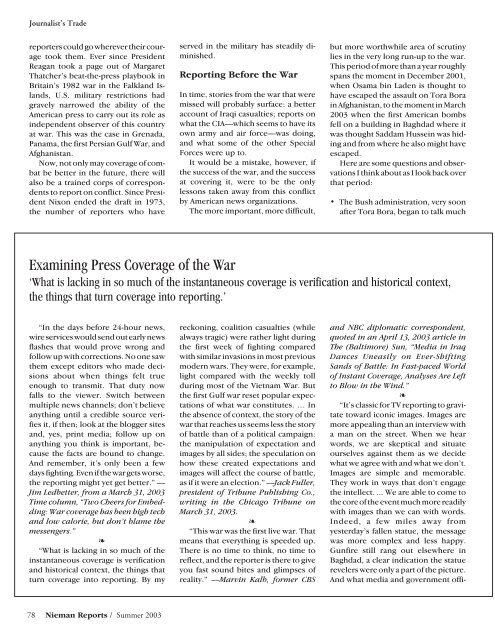summer-2003-Part 2-live - Nieman Foundation - Harvard University
summer-2003-Part 2-live - Nieman Foundation - Harvard University
summer-2003-Part 2-live - Nieman Foundation - Harvard University
- No tags were found...
Create successful ePaper yourself
Turn your PDF publications into a flip-book with our unique Google optimized e-Paper software.
Journalist’s Tradereporters could go wherever their couragetook them. Ever since PresidentReagan took a page out of MargaretThatcher’s beat-the-press playbook inBritain’s 1982 war in the Falkland Islands,U.S. military restrictions hadgravely narrowed the ability of theAmerican press to carry out its role asindependent observer of this countryat war. This was the case in Grenada,Panama, the first Persian Gulf War, andAfghanistan.Now, not only may coverage of combatbe better in the future, there willalso be a trained corps of correspondentsto report on conflict. Since PresidentNixon ended the draft in 1973,the number of reporters who haveserved in the military has steadily diminished.Reporting Before the WarIn time, stories from the war that weremissed will probably surface: a betteraccount of Iraqi casualties; reports onwhat the CIA—which seems to have itsown army and air force—was doing,and what some of the other SpecialForces were up to.It would be a mistake, however, ifthe success of the war, and the successat covering it, were to be the onlylessons taken away from this conflictby American news organizations.The more important, more difficult,but more worthwhile area of scrutinylies in the very long run-up to the war.This period of more than a year roughlyspans the moment in December 2001,when Osama bin Laden is thought tohave escaped the assault on Tora Borain Afghanistan, to the moment in March<strong>2003</strong> when the first American bombsfell on a building in Baghdad where itwas thought Saddam Hussein was hidingand from where he also might haveescaped.Here are some questions and observationsI think about as I look back overthat period:• The Bush administration, very soonafter Tora Bora, began to talk muchExamining Press Coverage of the War‘What is lacking in so much of the instantaneous coverage is verification and historical context,the things that turn coverage into reporting.’“In the days before 24-hour news,wire services would send out early newsflashes that would prove wrong andfollow up with corrections. No one sawthem except editors who made decisionsabout when things felt trueenough to transmit. That duty nowfalls to the viewer. Switch betweenmultiple news channels; don’t believeanything until a credible source verifiesit, if then; look at the blogger sitesand, yes, print media; follow up onanything you think is important, becausethe facts are bound to change.And remember, it’s only been a fewdays fighting. Even if the war gets worse,the reporting might yet get better.” ––Jim Ledbetter, from a March 31, <strong>2003</strong>Time column, “Two Cheers for Embedding:War coverage has been high techand low calorie, but don’t blame themessengers.”❧“What is lacking in so much of theinstantaneous coverage is verificationand historical context, the things thatturn coverage into reporting. By myreckoning, coalition casualties (whilealways tragic) were rather light duringthe first week of fighting comparedwith similar invasions in most previousmodern wars. They were, for example,light compared with the weekly tollduring most of the Vietnam War. Butthe first Gulf war reset popular expectationsof what war constitutes. … Inthe absence of context, the story of thewar that reaches us seems less the storyof battle than of a political campaign:the manipulation of expectation andimages by all sides; the speculation onhow these created expectations andimages will affect the course of battle,as if it were an election.” ––Jack Fuller,president of Tribune Publishing Co.,writing in the Chicago Tribune onMarch 31, <strong>2003</strong>.❧“This war was the first <strong>live</strong> war. Thatmeans that everything is speeded up.There is no time to think, no time toreflect, and the reporter is there to giveyou fast sound bites and glimpses ofreality.” ––Marvin Kalb, former CBSand NBC diplomatic correspondent,quoted in an April 13, <strong>2003</strong> article inThe (Baltimore) Sun, “Media in IraqDances Uneasily on Ever-ShiftingSands of Battle: In Fast-paced Worldof Instant Coverage, Analyses Are Leftto Blow in the Wind.”❧“It’s classic for TV reporting to gravitatetoward iconic images. Images aremore appealing than an interview witha man on the street. When we hearwords, we are skeptical and situateourselves against them as we decidewhat we agree with and what we don’t.Images are simple and memorable.They work in ways that don’t engagethe intellect. ... We are able to come tothe core of the event much more readilywith images than we can with words.Indeed, a few miles away fromyesterday’s fallen statue, the messagewas more complex and less happy.Gunfire still rang out elsewhere inBaghdad, a clear indication the statuerevelers were only a part of the picture.And what media and government offi-78 <strong>Nieman</strong> Reports / Summer <strong>2003</strong>
















